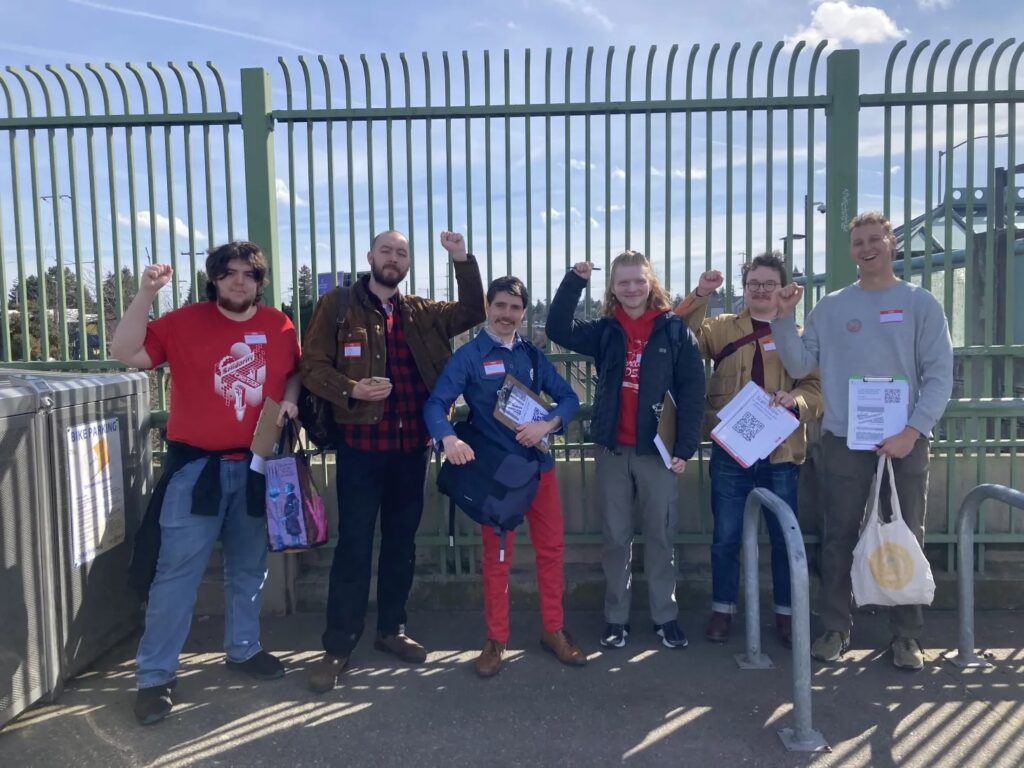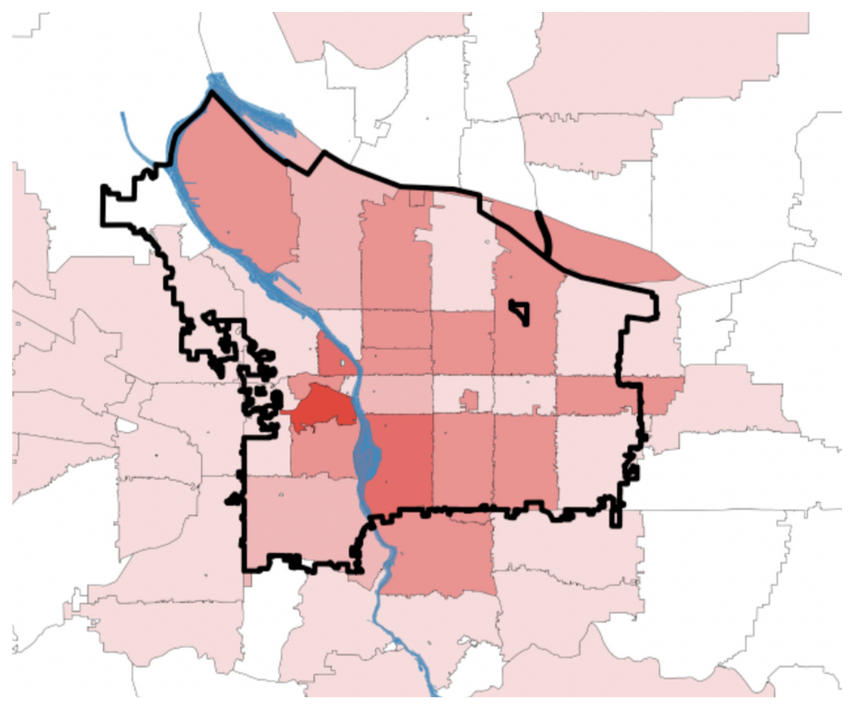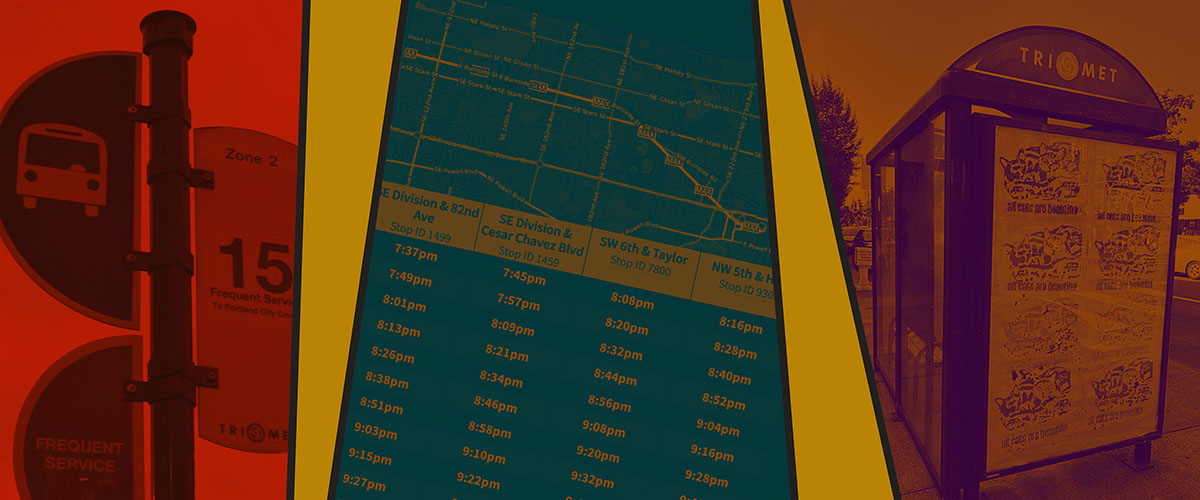By Ecosocialist WG member Jordan Lewis
Transit isn’t just a nice-to-have; someone in your community relies on it, and they deserve better service.

In anticipation of Oregon’s once-a-decade Transportation Package, which decides transportation spending priorities for the years ahead, Portland DSA boarded TriMet’s busiest bus and train routes to survey actual daily riders. Our goal was to learn the needs of those who depend on transit so we could best advocate for them in state deliberations over the transportation package. We felt riders were not advocated for in these negotiations, as proceedings tended to center lane expansion projects and a “back to basics” framing over any kind of transit service improvements. This was confirmed when the Oregon Transit Association warned of coming service cuts if the existing STIF Payroll tax were not raised from 0.1% to 0.5% (early drafts of the package proposed a mere 0.18% STIF rate).
“My commute time to work used to be 15 min to the Portland VA when the 64 still existed. Now my commute time is 1 hour with transfers even though I live 15 min driving distance from work. This has been an abysmal change that has made my workdays so much harder […] It doesn’t help that I am also disabled with constant chronic pain, to add to how difficult my life has become since this bus schedule was unnecessarily changed.”
The Ecosocialist Working Group, itself composed of many regular transit riders, recognized Elite Projection in how media, local and state governments told stories about public transit. While they describe our buses and trains as “Portland’s largest homeless shelter”, with otherwise fine service interrupted by homelessness on the streets and on trains, our membership did not think that was the whole story. Our suspicions were supported by Trimet’s own Attitude & Awareness Survey (A&A) which did report safety concerns twice as common as cleanliness or service concerns, but whose demographic data showed a non-representative sample. 66% (!) of A&A respondents had Bachelors Degrees or higher; 24% had the option to work fully-remote.
It is our belief that the A&A survey, which was distributed via advertisement, mail and e-mail to those already on TriMet’s internal contact lists, oversampled professional office workers who may not ride as much post-pandemic. Our survey was designed to be distributed in-person, either digitally or with pen and paper, to those riding the bus, MAX or streetcar during rush hour or on weekends. We thought this approach would better represent the average TriMet users who rely on it as a public service. We surveyed every “Frequent Service” transit route in the city of Portland in order to maximize response rate, and we selected sessions geographically in order to distribute surveys evenly across the city. We did not collect any identifying data other than ZIP Code, regularity of riding and Transit route (due to data privacy concerns), but the geographic distribution seemed very even across the city. In total, we canvassed 340 riders from 65 zip codes, across 33 transit routes. While 11% of our respondents rode less than once per week, 40% of “Attitude & Awareness” respondents rode less than once per month.

The survey findings did not totally contradict the A&A survey; most riders still listed passenger behavior as their most common negative experience, but poor stop shelter conditions trailed it by a few percentage points. When increased service frequencies were offered alongside increased outreach workers, the same riders who reported feeling unsafe preferred increased frequencies.
“Specific to the 77, more frequency. Overall unpleasant conditions at stops makes the experience waiting at the bus uncomfortable. I ride with my toddler and there is often human feces and drug paraphernalia. Lack of marked well lit crosswalks at stops also means I get off further than I would like to so that I can feel safer crossing at night.”
Our theory as Ecosocialists is that ridership follows service quality just as much as it follows homelessness rates. A strategy to improve transit service, both for current riders and for potential new ones, must prioritize increased service frequency, cleaning/maintenance of shelter facilities, and an increased presence of unarmed rider ambassadors to de-escalate difficult situations onboard.
“Most buses downtown have incredibly difficult disabled access. trimet security and police intimidate and harass people and delay trips and make riders feel unsafe. NARCAN. security should be public safety such as narcan, not policing fare.”
All of these improvements require an increase in funding to agencies like TriMet through raising the STIF Payroll Tax to at least 0.5% by 2030, and ideally to a full 1% by 2035.
The next steps are to lobby for these changes, both through discussion with state representatives and senators, and during the public testimony opportunities which are as-of-yet unannounced. The Package (now known as TRIP) is still under discussion, and so the specifics of the Bill have not yet been revealed, though a draft was released in early April and a controversial May memo has not inspired much confidence. Move Oregon Forward has an email form through which you can contact state officials with influence over the bill. Ecosocialist WG member Jordan Lewis has reserved a public communications slot at Portland City Hall at 9:30 AM on June 11, which he will use to present the findings of this report to city council.
You can view or download the full report here (PDF, 854KB):
“We need more seating and shelters at more stops, it sucks to have to stand at a stop while waiting for a ride.”

